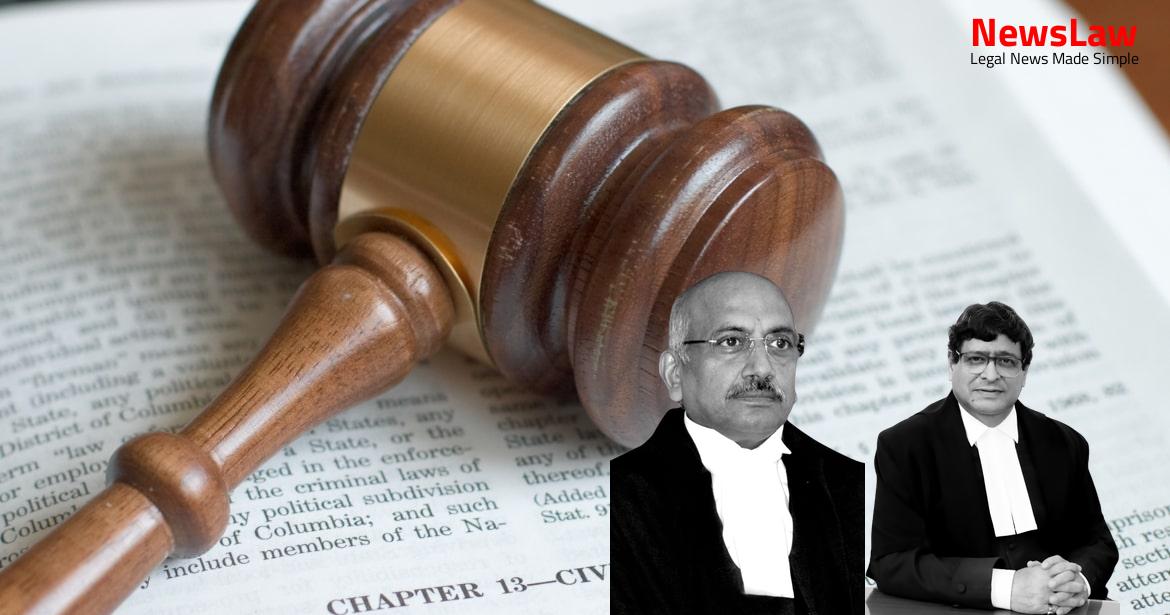Explore the in-depth legal analysis conducted by the court regarding property requisition and acquisition proceedings in a recent case. The court’s examination highlights the necessity of genuine urgency before invoking special powers and emphasizes the need for fair proceedings to respect landowners’ rights and objections. Understanding the court’s perspective on these matters is crucial in the realm of property law.
Facts
- The property requisitioned under the West Bengal Requisition Act had to be released by the State Government within 25 years.
- The Premises, owned by the Appellant, was not released even after the expiry of the 25-year period and possession remained with WBMDTCL.
- A notification under the Land Acquisition Act was issued on 12.08.1999 to acquire the Premises for the office accommodation of WBMDTCL.
- Writ Petitions were filed challenging the acquisition and seeking vacant possession of the Premises.
- The Single Judge of the High Court of Calcutta granted three months for WBMDTCL to vacate the Premises.
- The compensation issue was to be decided separately.
- The urgency provision under the Land Acquisition Act was invoked in another notification on 04.08.2000 for the same property.
- A declaration under section 6 of the Land Acquisition Act followed on 11.08.2000.
- The interim order was vacated as the petitioner did not press for continuation.
- No decision was made on any issue in the instant writ petition.
- The learned Single Judge’s judgment and order dated 16.01.2017 was set aside by consent of the parties.
- The writ petitions were to be heard de novo in six different appeals filed by the Land Acquisition Collector, WBMDTCL, and the First Land Acquisition Collector.
- The urgency provision was found to have been wrongly invoked in this case.
- The composite notification under section 4 read with section 17 of the Land Acquisition Act, dated 04.08.2000, was struck down.
- WBMDTCL was directed to vacate the Premises within three months and hand over vacant possession to the Appellant.
- The Division Bench of the High Court of Calcutta conducted a de novo hearing of the writ petitions and passed the impugned judgment and order dated 30.09.2019.
Also Read: Limitation Period in Arbitration Disputes: Court’s Legal Analysis
Issue
- The Division Bench identified several key issues to be considered in the case
- These issues included the liability of the appellants to vacate the requisitioned property after 25 years
- The entitlement of the respondent to compensation for overstaying at the property
- The potential impact on the respondent’s right of objection in the circumstances
- The question of whether the respondents could acquire the property using special powers in case of urgency, despite initially following the normal acquisition method
Also Read: Interpretation of Royalty in Software Import Case
Arguments
- The petitioner relied upon the judgments of the Court in State of U.P. v. Keshav Prasad Singh and State of A.P. v. Goverdhanlal Pitti for her arguments.
- Shri Mukul Rohatgi, representing the Appellant, refuted the petitioner’s arguments and relied on certain judgments favorable to the Appellant.
- He argued against entertaining the State’s appeals under Article 136 due to the conduct of the parties in not vacating the Premises by the specified date and continuing unauthorized possession without compensation.
- The petitioner argued that the notification under section 4 read with section 17 of the Land Acquisition Act should not be struck down as it was pursuant to an earlier court order.
- Ms. Liz Mathew, representing the State of West Bengal, challenged the impugned judgment of the Division Bench by pointing out that the State had acted in accordance with the order of the Single Judge.
Also Read: Interpretation of Section 43B: Debentures vs. Interest Payment
Analysis
- Section 10B of the West Bengal Requisition Act provides for the release of requisitioned property after a period of twenty-five years from the date of requisition.
- If no agreement can be reached regarding compensation for the requisitioned property, the State Government must appoint a District Judge or an Additional District Judge as an arbitrator.
- The procedure for fixing compensation under the Act involves determining the amount of compensation to be paid to all interested parties in accordance with set principles.
- Compensation can be fixed by agreement, and if not, it shall be determined as per the provisions outlined in the Act.
- The Division Bench analyzed the order dated 22.06.2000 and concluded that WBMDTCL had to vacate the premises within three months from that date, with no restriction on the State to proceed with acquisition proceedings.
- The Court found that invoking the urgency clause based on the order dated 22.06.2000 was unjustified and tainted with possible mala fides.
- The State did not invoke the urgency clause while acquiring the property, signifying that genuine public purpose still existed.
- The State had ample time to acquire the property in the usual course during the period between 1985 and 1987 under the Requisitioning and Acquisition of Immovable Property Act.
- The Division Bench upheld the validity of the acquisition proceedings initiated through the notification on 12.08.1999 under section 4 of the Land Acquisition Act.
- In State of U.P. v. Keshav Prasad Singh, (1995) 5 SCC 587 , this Court addressed a case of urgency involving a mandatory injunction to demolish a compound wall and restore possession.
- The High Court of Delhi found fault with the lack of mention of urgency in the notification issued for acquisition of property meant for residential use of government servants.
- The misuse of emergency powers under Section 17 of the Act was cautioned against, emphasizing the importance of fair proceedings before property acquisition.
- Judicial precedents highlighted the need for genuine urgency before invoking Section 17 and the significance of respecting landowners’ rights and objections under Section 5-A.
- Quashing of notifications for property acquisition due to invalid expressions of ‘urgency’ was upheld in various cases, emphasizing the need for proper justification for expedited processes.
- Lethargy in initiating acquisition proceedings and invoking emergency powers without valid reasons were criticized, emphasizing the importance of respecting landowners’ rights.
- WBMDTCL has been in possession of the Premises for 22 years without legal authority.
- The court does not find it justified to grant the requested extension till the end of the year.
Decision
- The Appellant’s submission regarding the unlawful possession of the Premises by WBMDTCL without compensation is accepted.
- An arbitrator, Shri Soumitra Pal, is appointed to determine compensation for the illegal occupation of the Premises.
- WBMDTCL has requested reasonable time to vacate the premises.
- The compensation/rent/occupational charges for the period of illegal occupation will be assessed by the Chief Judge, City Civil Court at Calcutta.
- WBMDTCL may be liable to pay Rs. 100 per square foot per month for the entire illegal occupation period if written authority for arbitrator appointment is not received within time.
- Parties may produce their valuers before the arbitrator for the assessment of damages.
- Initial payment of fees to the arbitrator by the petitioners and the Delhi Administration is required.
- WB Sugar Industries is given four months to vacate the Fifth Floor Premises upon submission of an undertaking.
- Both parties are instructed not to seek adjournment before the arbitrator to expedite the determination of interim compensation.
Case Title: PUNALUR PAPER MILLS LTD. Vs. WEST BENGAL MINERAL DEVELOPMENT AND TRADING CORPORATION LIMITED (2021 INSC 126)
Case Number: C.A. No.-000738-000739 / 2021



